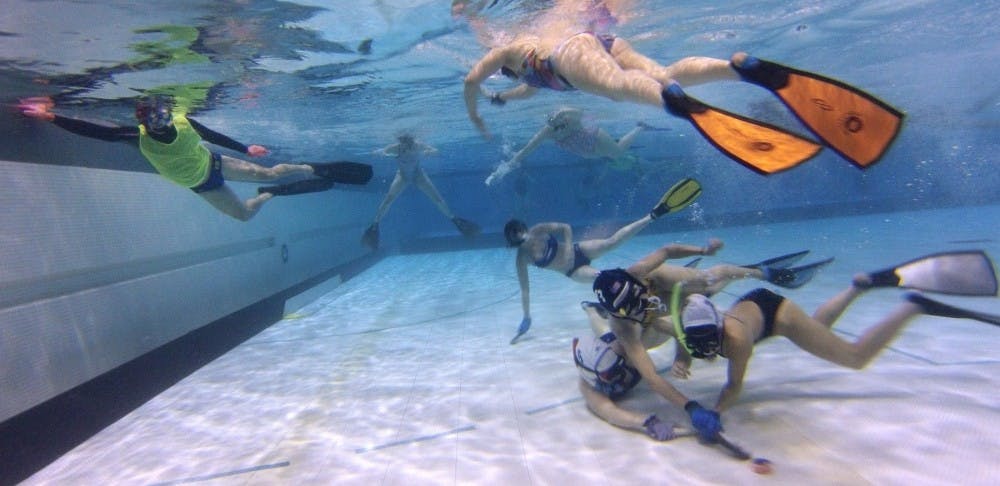 Under the watchful eye of a referee, upper left, a pair of teams battle for control of the weighted puck during the 2015 CanAm Midwestern Underwater Hockey & Rugby Championships on Sunday, Feb. 8, 2015, in Brown Deer, Wis. (Mark Hoffman/Milwaukee Journal Sentinel/TNS)
Under the watchful eye of a referee, upper left, a pair of teams battle for control of the weighted puck during the 2015 CanAm Midwestern Underwater Hockey & Rugby Championships on Sunday, Feb. 8, 2015, in Brown Deer, Wis. (Mark Hoffman/Milwaukee Journal Sentinel/TNS)The bright pink puck sinks to the bottom of the pool as swimmers, clad in snorkels, fins and water polo caps swim after it, holding plastic sticks about the size of the blades on ice skates.
Five players warm up while swimming laps at the Sun Devil Fitness Complex, gearing up for two hours of underwater hockey.
The sport, which is popular in both the U.S. and internationally, involves six players on a team, holding their breath and pushing the puck across the bottom of the pool with the plastic stick.
William Cleveland, one of the founding members of the team, is trying to bring underwater hockey to ASU. Cleveland started playing underwater hockey while a student at Georgia Tech, and when he moved to Arizona for work, he wanted to continue to play.
The team, which is based in Phoenix, has about 20 active members, Cleveland said. He said he hopes to gain some interest at ASU and hopefully start a student team.
Ruth Wylie, a professor in the Mary Lou Fulton Teacher’s College, is a team member and serves as a team liaison to spread the word to students she knows.
To spread the word, the team is offering lessons and practice sessions through the SDFC throughout the semester. The sessions cost $5 for students and run for four weeks. The next session begins March 4.
“We usually tell new players to try it out for three practices,” Cleveland said. “For the first practice, you really have to get used to using the equipment. You have to use a snorkel, fins and a water polo cap, and usually people are unfamiliar with at least one of those. The second practice, you can work on going to the bottom and trying it out, and by the third practice people usually get the hang of actually playing.”
The game is played in two, 15-minute long halves, and the team practices in 9 feet of water.
For people unfamiliar with the sport, Cleveland said it is slower-paced and less violent than regular hockey.
“The puck weighs three pounds, and it doesn’t really slide like a puck does in regular hockey, so players really have to just push it along the bottom of the pool.”
The team meets once a week on Wednesday nights, and accepts people of all skill and fitness levels, team member Kaitlin Judy said.
Judy said she got into the sport while in graduate school because her lab partner was president of the team at Georgia Tech. Since then, Judy has played on teams in Georgia and Arizona, and has also become a referee of the sport, even refereeing at the world competition in Hungary.
“People always ask if it’s violent like regular hockey,” Judy said. “Since it’s an amateur sport, usually people are pretty nice. Every once in a while there is a problem, but it’s really hard to actually fight, because you can’t breathe.”
Judy said underwater hockey is a great way for students to try a new activity while exercising.
“We really wanted to get some interest at ASU,” Judy said. “Anyone who wants to be involved in something that’s a little different, a little bit off the beaten path should try it. It’s a great way to stay in shape and it’s a great talking point.”
Reach the reporter at cvanek@asu.edu or follow her on Twitter @CorinaVanek.
Like The State Press on Facebook and follow @statepress on Twitter.




